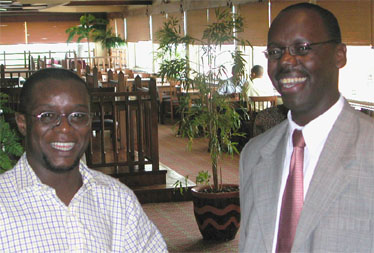|
|
 |
|||
|
TUTAFIKA: Imagining our Future - Tanzania |
|||
|
We all think about the future. In a period of profound uncertainty, we try to imagine the effects of events, both near and distant, on our daily lives, our institutions and on the choices that we have to make. There are no easy answers. Indeed, no person can predict accurately what will happen in the future. We can however, learn how to handle uncertainty. We can prepare ourselves to deal with outcomes that we may neither anticipate nor wish for. This is where scenarios are useful. They help us to think about the future and to prepare for what might happen. Scenarios describe different paths into the future. They are tools to bring out people’s thoughts and help them face different possibilities. They can be used to identify what needs to be done in order to achieve a desired goal. This web site is one of the products of the Tanzania Scenarios Project. It seeks to draw attention to and to provoke conversations on the issues and challenges facing Tanzanians in the coming years. It is the result of a process that began in May 2001 involving the participation of over 40 people, mostly young Tanzanians, in a series of discussions aimed at understanding the forces that have created the Tanzania in which we live today, identifying the forces that are shaping Tanzania’s future and imagining what a future Tanzania might be like. Why develop scenarios? Since the future is unpredictable, the Tanzania Scenarios Project team developed these scenarios to: The project developed three scenarios that Tanzania could face during the next few decades. They are called Yale Yale, Mibaka Uchumi and Amka Kumekucha. These stories have been published with the singular objective of catalysing a broad public debate on the possible futures that Tanzania might have to face and the individual and collective choices that will have to be made. Two key messages emerge from the team’s experience:
At the core of the Tanzania Scenarios Project is the learning objective. We ask whether it is possible for us to learn from our past experience and present circumstances in order to make adjustments for a better future? How will we do it? How will external forces influence this? What processes will facilitate such dialogue and adjustment? What responses should we expect? We are convinced that Tanzanians need to learn creatively and systematically in order to develop meaningful and lasting responses to the challenges and opportunities we all face. This learning calls for collaboration across experiences and divides. It calls on us to think about the consequences of our actions and to make informed choices. It calls on us to imagine and create the institutions In placing these stories within the public domain, we want to catalyze dialogue, at all levels of Tanzanian society, on what is needed for the country to face the future with confidence. We do not claim to have provided all the answers to the challenges facing Tanzania. In fact we are sure that you will identify gaps and issues that were not addressed. Our request is for you look beyond the gaps and to reflect individually and collectively, on the message of the stories. Abdu Simba & Aidan Eyakuze |
|||
| [Tutafika] [Intro to Scenarios] [Tanzania Today] [YaleYale] [Mibaka Uchumi] [Amka!] [Perspective] [About Tutafika] [Your comments] [About Tanzania] |
 , structures and leadership that are necessary to make deep changes and to carry these through.
, structures and leadership that are necessary to make deep changes and to carry these through.